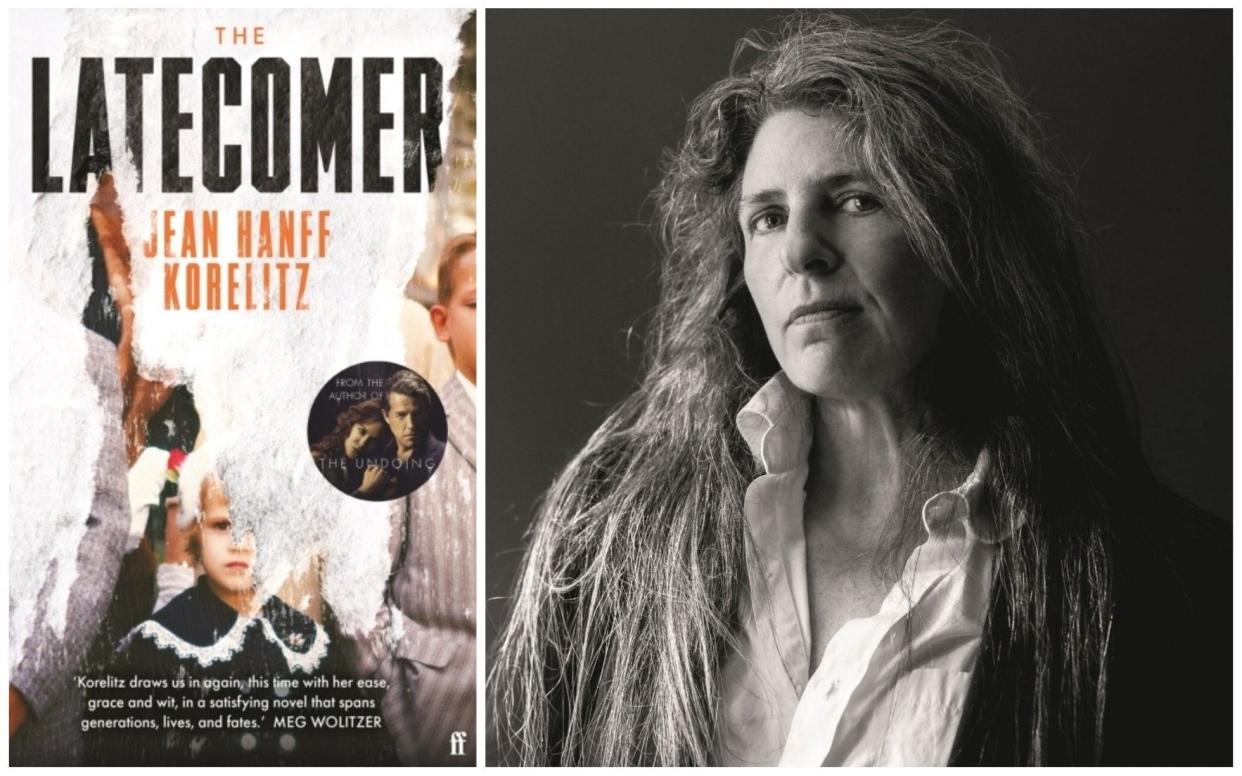The Latecomer by Jean Hanff Korelitz review: a mazy, Franzen-esque family saga

- Oops!Something went wrong.Please try again later.
- Oops!Something went wrong.Please try again later.
The American author Jean Hanff Korelitz has a knack for producing smart, psychologically astute page-turners. The Plot, pivoting on a case of identity theft, was 2021’s most entertaining highbrow beach read, while her adaptation of her noirish 2014 thriller You Should Have Known (retitled The Undoing) was HBO’s most watched TV show of 2020. Her new novel, The Latecomer, combines her interests in constructed identities and marital disarray within a mazy, old-fashioned Jonathan Franzen-style family saga.
The Oppenheimers are certainly a family unhappy in their very own way. Salo, of wealthy Jewish stock, is haunted by the deaths of two high-school friends, killed when the car he was driving hit a rock in the road. Despite the loving ministrations of his wife, Johanna, he struggles to find solace in family life, laboriously achieved after the sixth round of IVF produced triplets. Yet even as toddlers, his two sons and daughter nurture an implacable mutual loathing that only grows as they approach adulthood.
Poor Johanna, meanwhile, maintains a vice-like grip on her willed illusion of family harmony, papering the staircase walls in their Brooklyn townhouse with birthday photographs of her brood, and ignoring the way her husband spends nearly all his spare time with his art collection, in a nearby warehouse. Only when she finds out what else he is up to does she fish her final frozen embryo out of storage and, with the help of a “gestational carrier”, has another baby, Phoebe, just as her three older children are making good their escape to college.
Korelitz writes with such effortless fluidity, you can almost see the sentences gushing, fully formed, onto the page. She takes luxurious time in detailing every inch of her canvas, be it Salo’s restless “tumbling” sensations in the years after the accident – from which he suddenly finds respite in the transfixing presence of a painting by a then-unknown Cy Twombly – or the triplets’ adolescent struggles to work out who they are. She’s the sort of writer who will happily devote a page or two to a potted history of a stray brother who never appears. And she slips inside the heads of each Oppenheimer with such easy, confiding intimacy that we see the world just as they do.
She’s also effervescently funny on the quagmire of modern American identity politics. The triplets, Harrison, Sally and Lewyn, attend the sort of school that doesn’t award grades and forgoes the classics in favour of classes on interpersonal conflict resolution. There’s an amusing scene in which Lewyn attends a college mock-Passover feast with his Mormon frat friends, in which an orange has been placed next to the lamb and horseradish to symbolise “the inclusion of all sexualities and genders”. Harrison, a staunch believer in meritocracy, bucks against the “anti-intellectualism” of his school and seeks out fellow-minded male conservatives at a college that rejects liberal orthodoxies. Yet it’s a pity that Korelitz, having given credibility to both sides of the culture wars, then rigs the debate against Harrison, who develops from a not entirely unreasonable iconoclast into a pundit whose quasi-white-supremacist views make him a staple on Fox TV.
Yet despite its supreme writerly confidence, The Latecomer feels like a fairly sloppy book. Much of the drama hinges on the triplets’ fomenting hostility, yet with no reason given, the reader struggles to buy into the psychological dynamics. It’s nearly always dubious when a novelist invokes 9/11 for plot purposes; Korelitz’s use of it here to generate a family tragedy feels expedient. Various thematic threads, notably the human instinct to hoard, wend through the narrative, yet in a novel that is stronger in breadth than in depth, their metaphorical resonance is diffuse and whimsical rather than satisfying.
As the novel proceeds, Korelitz’s approach to plot becomes ever more reminiscent of a good fairy madly waving her wand. The final third is narrated by Phoebe, now 17, who resolves to sort out her family once and for all with a sequence of interventions as magically efficacious as the denouement to any Shakespearean comedy. There’s a bizarre and seismic revelation concerning Harrison’s best friend, a black academic, but it is dispatched so briskly that it leaves the poor reader gasping to draw breath. The quixotic effect is surely intentional, yet this reader felt short-changed.
The Latecomer is published by Faber at £8.99. To order your copy call 0844 871 1514 or visit Telegraph Books

